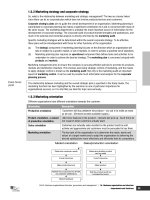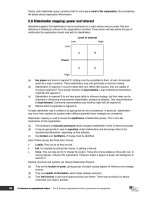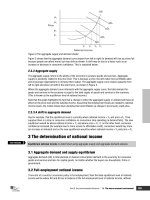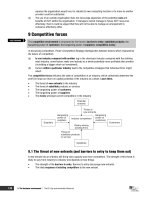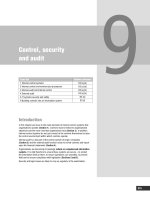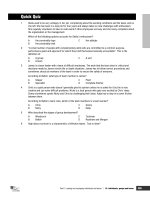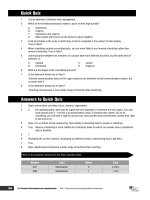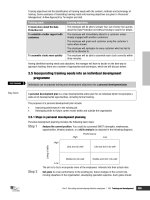ACCA paper strategic business reporting 2
Bạn đang xem bản rút gọn của tài liệu. Xem và tải ngay bản đầy đủ của tài liệu tại đây (230.18 KB, 20 trang )
Professional Examinations
SBR (INT and UK)
Strategic Business Reporting
EXAM KIT
S B R : S TRA TE G IC BU SINES S RE POR TI N G ( IN T A ND UK )
British Library Cataloguing-in-Publication Data
A catalogue record for this book is available from the British Library.
Published by:
Kaplan Publishing UK
Unit 2 The Business Centre
Molly Millar’s Lane
Wokingham
Berkshire
RG41 2QZ
ISBN: 978-1-78415-842-2
© Kaplan Financial Limited, 2018
The text in this material and any others made available by any Kaplan Group company does not
amount to advice on a particular matter and should not be taken as such. No reliance should be
placed on the content as the basis for any investment or other decision or in connection with any
advice given to third parties. Please consult your appropriate professional adviser as necessary.
Kaplan Publishing Limited, all other Kaplan group companies, the International Accounting
Standards Board, and the IFRS Foundation expressly disclaim all liability to any person in respect
of any losses or other claims, whether direct, indirect, incidental, consequential or otherwise
arising in relation to the use of such materials. Printed and bound in Great Britain.
Acknowledgements
This Product includes propriety content of the International Accounting Standards Board which is
overseen by the IFRS Foundation, and is used with the express permission of the IFRS Foundation
under licence. All rights reserved. No part of this publication may be reproduced, stored in a
retrieval system, or transmitted in any form or by any means, electronic, mechanical,
photocopying, recording, or otherwise, without prior written permission of Kaplan Publishing and
the IFRS Foundation.
The IFRS Foundation logo, the IASB logo, the IFRS for SMEs logo, the “Hexagon Device”, “IFRS
Foundation”, “eIFRS”, “IAS”, “IASB”, “IFRS for SMEs”, “IFRS”, “IASs”, “IFRSs”, “International
Accounting Standards” and “International Financial Reporting Standards”, “IFRIC” and “IFRS
Taxonomy” are Trade Marks of the IFRS Foundation.
Trade Marks
The IFRS Foundation logo, the IASB logo, the IFRS for SMEs logo, the “Hexagon Device”, “IFRS
Foundation”, “eIFRS”, “IAS”, “IASB”, “IFRS for SMEs”, “NIIF” IASs” “IFRS”, “IFRSs”, “International
Accounting Standards”, “International Financial Reporting Standards”, “IFRIC”, “SIC” and “IFRS
Taxonomy”.
Further details of the Trade Marks including details of countries where the Trade Marks are
registered or applied for are available from the Foundation on request.
This product contains material that is ©Financial Reporting Council Ltd (FRC). Adapted and
reproduced with the kind permission of the Financial Reporting Council. All rights reserved. For
further information, please visit www.frc.org.uk or call +44 (0)20 7492 2300.
P.2
K A P LA N P UB L I S H I N G
CONTENTS
Page
Index to questions and answers
P.5
Exam technique
P.9
Paper specific information
P.11
Kaplan’s recommended revision approach
P.13
Kaplan’s detailed revision plan
P.17
Section
1
2
Practice questions
1
UK GAAP focus questions
65
Answers to practice questions
69
UK GAAP focus answers
236
3
References
247
–
Specimen exam paper
–
This document references IFRS® Standards and IAS® Standards, which are authored by the
International Accounting Standards Board (the Board), and published in the 2017 IFRS Standards
Red Book.
K APLAN P UBLI S H I N G
P.3
Section 1
PRACTICE QUESTIONS
SECTION A QUESTIONS – GROUP FINANCIAL STATEMENTS
1
MARCHANT
Walk in the footsteps of a top tutor
Tutorial note
This question requires the preparation of a consolidated statement of profit or loss and other
comprehensive income. The examining team have said that the preparation of full consolidated
financial statements is unlikely to appear in the Strategic Business Reporting exam. However this
question still provides important revision of a range of consolidation issues.
The following draft financial statements relate to Marchant, a public limited company, and
companies it has investments in.
Marchant Group: Draft statements of profit or loss and other comprehensive income for
the year ended 30 April 20X4.
Marchant
Nathan
Option
$m
$m
$m
400
115
70
Revenue
(312)
(65)
(36)
Cost of sales
––––
––––
–––
88
50
34
Gross profit
21
7
2
Other income
(15)
(9)
(12)
Administrative costs
Other expenses
(35)
(19)
(8)
––––
––––
–––
59
29
16
Operating profit
(5)
(6)
(4)
Finance costs
6
5
8
Finance income
––––
––––
–––
60
28
20
Profit before tax
(19)
(9)
(5)
Income tax expense
––––
––––
–––
41
19
15
Profit for the year
––––
––––
–––
10
2
–
Other comprehensive income – revaluation gains
––––
––––
–––
Total comprehensive income for year
51
21
15
––––
––––
–––
KAPLAN P UBLI S H I N G
1
S B R : S TRA TE G IC BU SINES S RE POR TI N G ( IN T A ND UK )
The following information is relevant to the preparation of the group statement of profit or
loss and other comprehensive income:
1
On 1 May 20X2, Marchant acquired 60% of the equity interests of Nathan, a public
limited company. The purchase consideration comprised cash of $80 million and the
fair value of the identifiable net assets acquired was $110 million at that date. The
fair value of the non-controlling interest (NCI) in Nathan was $45 million on 1 May
20X2. Marchant wishes to use the ‘full goodwill’ method for all acquisitions. The
share capital and retained earnings of Nathan were $25 million and $65 million
respectively and other components of equity were $6 million at the date of
acquisition. The excess of the fair value of the identifiable net assets at acquisition is
due to non-depreciable land.
Goodwill has been impairment tested annually and as at 30 April 20X3 had reduced
in value by 20%. However at 30 April 20X4, the impairment of goodwill had reversed
and goodwill was valued at $2 million above its original value. This upward change in
value has already been included in above draft financial statements of Marchant
prior to the preparation of the group accounts.
2
2
Marchant disposed of an 8% equity interest in Nathan on 30 April 20X4 for a cash
consideration of $18 million and had accounted for the gain or loss in other income.
The carrying amount of the net assets of Nathan at 30 April 20X4 was $120 million
before any adjustments on consolidation. Marchant accounts for investments in
subsidiaries using IFRS 9 Financial Instruments and has made an election to show
gains and losses in other comprehensive income. The carrying amount of the
investment in Nathan was $90 million at 30 April 20X3 and $95 million at 30 April
20X4 before the disposal of the equity interest.
3
Marchant acquired 60% of the equity interests of Option, a public limited company,
on 30 April 20X2. The purchase consideration was cash of $70 million. Option’s
identifiable net assets were fair valued at $86 million and the NCI had a fair value of
$28 million at that date. On 1 November 20X3, Marchant disposed of a 40% equity
interest in Option for a consideration of $50 million. Option’s identifiable net assets
were $90 million and the value of the NCI was $34 million at the date of disposal. The
remaining equity interest was fair valued at $40 million. After the disposal, Marchant
exerts significant influence. Any increase in net assets since acquisition has been
reported in profit or loss and the carrying amount of the investment in Option had
not changed since acquisition. Goodwill had been impairment tested and no
impairment was required. No entries had been made in the financial statements of
Marchant for this transaction other than for cash received.
4
Marchant sold inventory to Nathan for its fair value of $12 million. Marchant made a
loss on the transaction of $2 million. Nathan still holds $8 million of this inventory at
the year end.
5
Ignore the taxation effects of the above adjustments. Any expense adjustments
should be amended in other expenses.
K A P LA N P UB L I S H I N G
PRACTICE QU ESTIONS : S E CT I ON 1
Required:
(a)
(i)
Prepare a consolidated statement of profit or loss and other comprehensive
income for the year ended 30 April 20X4 for the Marchant Group.
Note: Do not adjust your answer for the information presented in part (b)
(20 marks)
(ii)
(b)
Explain, with suitable calculations, how the sale of the 8% interest in Nathan
should be dealt with in the group statement of financial position at 30 April
20X4.
(5 marks)
Marchant held a portfolio of trade receivables with a carrying amount of $4 million at
30 April 20X4. At that date, the entity entered into a factoring agreement with a
bank, whereby it transferred the receivables in exchange for $3.6 million in cash.
Marchant has agreed to reimburse the factor for any shortfall between the amount
collected and $3.6 million. Once the receivables have been collected, any amounts
above $3.6 million, less interest on this amount, will be repaid to Marchant.
Marchant has derecognised the receivables and charged $0.4 million as a loss to
profit or loss.
Required:
Outline the rules in IFRS 9 Financial Instruments relating to the derecognition of a
financial asset and discuss how these rules affect the treatment of the portfolio of
trade receivables in Marchant’s financial statements.
(7 marks)
(Total: 32 marks)
KAPLAN P UBLI S H I N G
3
S B R : S TRA TE G IC BU SINES S RE POR TI N G ( IN T A ND UK )
2
ANGEL
Walk in the footsteps of a top tutor
Tutorial note
This question requires the preparation of a consolidated statement of cash flows. The
examining team have said that the preparation of full consolidated financial statements is
unlikely to appear in the Strategic Business Reporting exam. However this question still
provides important revision of a range of consolidation issues.
The following draft group financial statements relate to Angel, a public limited company:
Angel Group: Statement of financial position as at 30 November 20X3
30 November
20X3
$m
Assets
Non-current assets
Property, plant and equipment
Goodwill
Other intangible assets
Investment in associate
Financial assets
Current assets
Inventories
Trade receivables
Cash and cash equivalents
Total assets
Equity and liabilities
Share capital
Retained earnings
Other components of equity
Non-controlling interest
Total equity
4
30 November
20X2
$m
475
105
150
80
215
––––––
1,025
––––––
465
120
240
180
––––––
1,005
––––––
155
125
465
––––––
745
––––––
1,770
––––––
190
180
355
––––––
725
––––––
1,730
––––––
850
456
29
––––––
1,335
––––––
90
––––––
1,425
––––––
625
359
20
––––––
1,004
––––––
65
––––––
1,069
––––––
K A P LA N P UB L I S H I N G
PRACTICE QU ESTIONS : S E CT I ON 1
30 November
20X3
$m
Non-current liabilities
Long-term borrowings
Deferred tax
Retirement benefit liability
Total non-current liabilities
26
35
80
––––––
141
––––––
30 November
20X2
$m
57
31
74
––––––
162
––––––
Current liabilities
Trade payables
Current tax payable
155
361
49
138
––––––
––––––
Total current liabilities
204
499
––––––
––––––
Total liabilities
345
661
––––––
––––––
Total equity and liabilities
1,770
1,730
––––––
––––––
Angel Group: Statement of profit or loss and other comprehensive income for the year
ended 30 November 20X3
Revenue
Cost of sales
Gross profit
Other income
Administrative expenses
Other expenses
Operating profit
Finance costs
Share of profit of associate
Profit before tax
Income tax expense
Profit for the year
Profit attributable to:
Owners of parent
Non-controlling interest
KAPLAN P UBLI S H I N G
$m
1,238
(986)
–––––
252
30
(45)
(50)
–––––
187
(11)
12
–––––
188
(46)
–––––
142
–––––
111
31
–––––
142
–––––
5
S B R : S TRA TE G IC BU SINES S RE POR TI N G ( IN T A ND UK )
$m
Other comprehensive income:
Items that will not be reclassified to profit or loss
Revaluation of property, plant and equipment
Actuarial losses on defined benefit plan
Tax relating to items not reclassified
8
(4)
(2)
–––––
2
–––––
Total items that will not be reclassified to profit or loss
Items that may be reclassified to profit or loss
Financial assets
Tax relating to items that may be reclassified
4
(1)
–––––
3
–––––
5
–––––
147
–––––
Total items that may be reclassified to profit or loss
Other comprehensive income (net of tax) for the year
Total comprehensive income for year
Total comprehensive income attributable to:
Owners of the parent
Non-controlling interest
116
31
–––––
147
–––––
Angel Group: Extracts from statement of changes in equity for the year ended 30
November 20X3
Balance 1 December 20X2
Share capital issued
Dividends for year
Total comprehensive
income for the year
Balance 30 November 20X3
Share
capital
$m
625
225
Retained
earnings
$m
359
Other
components
Other
of equity – components
Nonof equity –
financial
revaluation controlling
assets
interest
reserve
reserve
$m
$m
$m
15
5
65
(10)
––––
850
––––
107
––––
456
––––
(6)
3
–––
18
–––
6
–––
11
–––
31
–––
90
–––
The following information relates to the financial statements of the Angel Group:
(i)
6
On 1 December 20X2, Angel acquired all of the share capital of Sweety for
$30 million. The carrying amounts of the identifiable net assets in Sweety’s individual
financial statements and the fair values are set out below, together with their tax
base. Goodwill arising on acquisition is not deductible for tax purposes. There were
no other acquisitions in the period. The tax rate is 30%.
K A P LA N P UB L I S H I N G
PRACTICE QU ESTIONS : S E CT I ON 1
The fair values in the table below have been reflected in the year-end balances of the
Angel Group.
Property, plant and equipment
Inventories
Trade receivables
Cash and cash equivalents
Total assets
Trade payables
Retirement benefit obligations
Deferred tax liability
Net assets at acquisition
(ii)
Carrying
amounts
$ million
12
5
3
2
––––
22
(4)
(1)
(0.6)
––––
16.4
––––
Tax base
$ million
10
4
3
2
––––
19
(4)
––––
15
––––
Fair values
$million
(excluding
deferred
taxation)
14
6
3
2
––––
25
(4)
(1)
––––
20
––––
The retirement benefit is classified as a non-current liability in the statement of
financial position and comprises the following:
Net obligation at 1 December 20X2
Net interest cost
Current service cost
Contributions to scheme
Remeasurements – actuarial losses
Net obligation at 30 November 20X3
$m
74
3
8
(9)
4
––––
80
––––
The benefits paid in the period by the trustees of the scheme were $6 million. Angel
had included the obligation assumed on the purchase of Sweety in current service
cost above, although the charge to administrative expenses was correct in the
statement of profit and loss and other comprehensive income. There were no tax
implications regarding the retirement benefit obligation. Defined benefit costs are
included in administrative expenses.
(iii)
Property, plant and equipment (PPE) with a carrying amount of $49 million was
disposed of for cash proceeds of $63 million. The gain on disposal is included in
administrative expenses. Depreciation charged to profit or loss in the year was $29
million.
(iv)
Angel purchased a 30% interest in an associate for cash on 1 December 20X2. The net
assets of the associate at the date of acquisition were $280 million. The associate
made a profit after tax of $40 million and paid a dividend of $10 million out of these
profits in the year ended 30 November 20X3. Angel does not hold investments in any
other associate entities.
KAPLAN P UBLI S H I N G
7
S B R : S TRA TE G IC BU SINES S RE POR TI N G ( IN T A ND UK )
(v)
An impairment test carried out at 30 November 20X3 showed that goodwill and
other intangible assets were impaired. The impairment of goodwill relates to
100% owned subsidiaries.
(vi)
The following schedule relates to the financial assets owned by Angel:
$m
180
(26)
57
4
––––
215
––––
Balance 1 December 20X2
Less carrying amount of financial assets disposed
Add purchases of financial assets
Add gain on revaluation of financial assets
Balance at 30 November 20X3
The sale proceeds of the financial assets were $40 million. Profit on the sale of the
financial assets is included in ‘other income’ in the financial statements.
(vii)
The finance costs were all paid in cash in the period.
Required:
(a)
Prepare a consolidated statement of cash flows using the indirect method for the
Angel Group plc for the year ended 30 November 20X3 in accordance with the
requirements of IAS 7 Statement of Cash Flows.
Note: The notes to the statement of cash flows are not required.
(b)
(25 marks)
The directors of Angel have deposited funds with a bank in two accounts as follows:
(i)
$3 million into a 12-month term account, earning 3.5% interest. The cash can
be withdrawn by giving 14 days’ notice but Angel will incur a penalty, being the
loss of all interest earned.
(ii)
$7 million into a 12-month term account earning 3% interest. The cash can be
withdrawn by giving 21 days’ notice. Interest will be paid for the period of the
deposit but if money is withdrawn, the interest will be at the rate of 2%, which
is equivalent to the bank’s stated rate for short-term deposits.
Angel is confident that it will not need to withdraw the cash from the higher-rate
deposit within the term, but wants to keep easy access to the remaining $7 million to
cover any working capital shortfalls which might arise.
Required:
Advise Angel on whether each of the funds meets the definition of a ‘cash
equivalent’.
(5 marks)
(Total: 30 marks)
8
K A P LA N P UB L I S H I N G
PRACTICE QU ESTIONS : S E CT I ON 1
3
TRAVELER
Walk in the footsteps of a top tutor
Tutorial note
This question requires the preparation of a consolidated statement of financial position. The
examining team have said that the preparation of full consolidated financial statements is
unlikely to appear in the Strategic Business Reporting exam. However this question still
provides important revision of a range of consolidation issues.
Traveler, a public limited company, operates in the manufacturing sector. The draft
statements of financial position are as follows at 30 November 20X1:
Traveler
$m
Assets:
Non-current assets
Property, plant and equipment
Investments in subsidiaries
Data
Captive
Financial assets
Current assets
Total assets
Equity and liabilities:
Share capital
Retained earnings
Other components of equity
Total equity
Non-current liabilities
Current liabilities
Total equity and liabilities
KAPLAN P UBLI S H I N G
Data
$m
Captive
$m
439
810
620
820
541
108
––––––
1,908
1,067
––––––
2,975
––––––
10
––––––
820
781
––––––
1,601
––––––
20
––––––
640
350
––––––
990
––––––
1,120
1,066
60
––––––
2,246
––––––
455
274
––––––
2,975
––––––
600
442
37
––––––
1,079
––––––
323
199
––––––
1,601
––––––
390
169
45
––––––
604
––––––
73
313
––––––
990
––––––
9
S B R : S TRA TE G IC BU SINES S RE POR TI N G ( IN T A ND UK )
The following information is relevant to the preparation of the group financial statements:
1
On 1 December 20X0, Traveler acquired 60% of the equity interests of Data, a public
limited company. The purchase consideration comprised cash of $600 million. At
acquisition, the fair value of the non-controlling interest in Data was $395 million.
Traveler wishes to use the ‘full goodwill’ method. On 1 December 20X0, the fair value
of the identifiable net assets acquired was $935 million and retained earnings of Data
were $299 million and other components of equity were $26 million. The excess in
fair value is due to non-depreciable land.
On 30 November 20X1, Traveler acquired a further 20% interest in Data for a cash
consideration of $220 million.
2
On 1 December 20X0, Traveler acquired 80% of the equity interests of Captive for a
consideration of $541 million. The consideration comprised cash of $477 million and
the transfer of non-depreciable land with a fair value of $64 million. The carrying
amount of the land at the acquisition date was $56 million. At the year end, this asset
was still included in the non-current assets of Traveler and the sale proceeds had
been credited to profit or loss.
At the date of acquisition, the identifiable net assets of Captive had a fair value of
$526 million, retained earnings were $90 million and other components of equity
were $24 million. The excess in fair value is due to non-depreciable land. This
acquisition was accounted for using the partial goodwill method in accordance with
IFRS 3 Business Combinations.
3
Goodwill was impairment tested after the additional acquisition in Data on
30 November 20X1. The recoverable amount of Data was $1,099 million and that of
Captive was $700 million.
Required:
(a)
Prepare a consolidated statement of financial position for the Traveler Group for
the year ended 30 November 20X1.
(25 marks)
Traveler has three distinct business segments. The management has calculated the net
assets, turnover and profit before common costs, which are to be allocated to these
segments. However, they are unsure as to how they should allocate certain common costs
and whether they can exercise judgement in the allocation process. They wish to allocate
head office management expenses; pension expense; the cost of managing properties and
interest and related interest bearing assets. They also are uncertain as to whether the
allocation of costs has to be in conformity with the accounting policies used in the financial
statements.
Required:
(b)
Advise the management of Traveler on the points raised in the above paragraph.
(8 marks)
(Total: 33 marks)
10
K A P LA N P UB L I S H I N G
PRACTICE QU ESTIONS : S E CT I ON 1
4
ROSE
Walk in the footsteps of a top tutor
Tutorial note
This question requires the preparation of a consolidated statement of financial position
where one of the subsidiaries presents its financial statements in a different currency to the
group. The examining team have said that the preparation of full consolidated financial
statements is unlikely to appear in the Strategic Business Reporting exam. However this
question still provides important revision of a range of consolidation issues.
Rose, a public limited company, operates in the mining sector. The draft statements of
financial position are as follows, at 30 April 20X1:
Assets
Non-current assets
Property, plant and equipment
Investments in subsidiaries
Petal
Stem
Current assets
Total assets
Equity and liabilities
Share capital
Retained earnings
Other components of equity
Total equity
Non-current liabilities
Current liabilities
Total liabilities
Total equity and liabilities
KAPLAN P UBLI S H I N G
Rose
$m
Petal
$m
Stem
Dinars m
385
117
430
113
46
––––
544
118
––––
662
––––
––––
117
100
––––
217
––––
––––
430
330
––––
760
––––
158
256
7
––––
421
––––
56
185
––––
241
––––
662
––––
38
56
4
––––
98
––––
42
77
––––
119
––––
217
––––
200
300
–
––––
500
––––
160
100
––––
260
––––
760
––––
11
S B R : S TRA TE G IC BU SINES S RE POR TI N G ( IN T A ND UK )
The following information is relevant to the preparation of the group financial statements:
1
On 1 May 20X0, Rose acquired 70% of the equity interests of Petal, a public limited
company. The purchase consideration comprised cash of $94 million. The fair value
of the identifiable net assets recognised by Petal was $120 million excluding the
patent below. The identifiable net assets of Petal at 1 May 20X0 included a patent
which had a fair value of $4 million. This had not been recognised in the financial
statements of Petal. The patent had a remaining term of four years to run at that
date and is not renewable. The retained earnings of Petal were $49 million and other
components of equity were $3 million at the date of acquisition. The remaining
excess of the fair value of the net assets is due to an increase in the value of land.
Rose wishes to use the ‘full goodwill’ method. The fair value of the non-controlling
interest in Petal was $46 million on 1 May 20X0. There have been no issues of
ordinary shares since acquisition and goodwill on acquisition is not impaired.
Rose acquired a further 10% interest from the non-controlling interest in Petal on
30 April 20X1 for a cash consideration of $19 million.
2
Rose acquired 52% of the ordinary shares of Stem on 1 May 20X0 when Stem’s
retained earnings were 220 million dinars. The fair value of the identifiable net assets
of Stem on 1 May 20X0 was 495 million dinars. The excess of the fair value over the
net assets of Stem is due to an increase in the value of land. Rose wishes to use the
‘full goodwill’ method. The fair value of the non-controlling interest in Stem at 1 May
20X0 was 250 million dinars. There have been no issues of ordinary shares and no
impairment of goodwill since acquisition.
The following exchange rates are relevant to the preparation of the group financial
statements:
1 May 20X0
30 April 20X1
Average for year to 30 April 20X1
Dinars to $
6
5
5.8
Required:
(a)
Prepare a consolidated statement of financial position of the Rose Group at 30
April 20X1, in accordance with International Financial Reporting Standards,
showing the exchange difference arising on the translation of Stem’s net assets.
Ignore deferred taxation.
(22 marks)
(b)
The directors of Rose are not fully aware of the requirements of IAS 21 The Effects of
Changes in Foreign Exchange Rates in relation to exchange rate differences. They
would like advice on how exchange differences should be recorded on both
monetary and non-monetary assets in the financial statements and how these differ
from the requirements for the translation of an overseas entity. The directors also
wish advice on what would happen to the exchange differences if Rose sold all of its
equity shares in Stem.
Required:
Provide a brief memo for the directors of Rose which identifies the correct
accounting treatment for the various issues raised.
(8 marks)
(Total: 30 marks)
12
K A P LA N P UB L I S H I N G
PRACTICE QU ESTIONS : S E CT I ON 1
5
BUBBLE
Walk in the footsteps of a top tutor
The following extracts from draft financial statements relate to Bubble, a public limited
company, and Tyslar, a company in which it has an investment.
Extracts from draft statements of financial position as at 31 October 20X5
Bubble
$m
Assets
Non-current assets
Property, plant and equipment
Investment in Tyslar
Financial assets
Total non-current assets
Equity
Equity shares ($1 each)
Retained earnings
Other components of equity
Total equity
Tyslar
Dinars m
280
46
122
––––
448
––––
390
–
98
––––
488
––––
80
230
40
––––
350
––––
210
292
–
––––
502
––––
The following information is relevant to the preparation of the consolidated statement of
financial position:
1
Bubble owns 60% of the equity shares of Tyslar, a company located overseas which
has presented its financial statements in dinars. The shares in Tyslar were acquired
on 1 November 20X4.
At the date of acquisition, retained earnings were 258 million dinars and Tyslar had
no other components of equity. On this date, non-depreciable land was carried in the
financial statements of Tyslar at 50 million dinars but it had a fair value of 70 million
dinars.
The non-controlling interest at acquisition is to be calculated at fair value by
reference to the quoted share price of Tyslar. At the acquisition date, the quoted
share price was 2.62 dinars per share.
An impairment review of goodwill was undertaken as at 31 October 20X5. The
goodwill of Tyslar is to be impaired by 20%. Tyslar has not issued any equity shares
since acquisition.
2
Bubble wished to expand its overseas operations and on 1 May 20X5 acquired an
overseas property with a fair value of 58.5 million dinars. In exchange for the
building, Bubble paid the supplier with land which Bubble had held but for which it
had yet to determine its use. The carrying amount of the land was $5 million but it
had an open market value of $7 million. Bubble was unsure as to how to deal with
this transaction and so has transferred $5 million from investment properties to
property, plant and equipment. The transaction has commercial substance.
KAPLAN P UBLI S H I N G
13
S B R : S TRA TE G IC BU SINES S RE POR TI N G ( IN T A ND UK )
In addition, Bubble spent $0.5 million to help relocate staff to the new property and
added this amount to the cost of the building. Bubble has made no other entries in
its financial statements in relation to the property. Bubble has a policy of
depreciating properties over 35 years and follows the revaluation model under IAS 16
Property, Plant & Equipment. As a result of a surge in the market, it is estimated that
the fair value of the property is 75 million dinars as at 31 October 20X5.
3
The following exchange rates have been provided:
1 November 20X4
1 May 20X5
31 October 20X5
Average for the year to 31 October 20X5
Dinars to $
8
9
9.5
8.5
Required:
(a)
(b)
(i)
Calculate, with supporting explanations, the value of goodwill arising on the
acquisition of Tyslar that should be reported in the consolidated statement
of financial position as at 31 October 20X5.
(7 marks)
(ii)
Explain why foreign exchange differences arise on the retranslation of Tyslar
and how they are accounted for in the consolidated financial statements. As
part of your answer you should calculate the balance on the group
translation reserve as at 31 October 20X5.
(10 marks)
(iii)
Advise the directors of Bubble on how to correct the accounting treatment of
the overseas property (note 2), showing the adjustments needed, and
calculate the ‘property, plant and equipment’ balance as it would appear in
the consolidated statement of financial position as at 31 October 20X5.
(8 marks)
Tyslar operates a mine. Its income is denominated and settled in dinars. The output
of the mine is routinely traded in dinars and its price is determined initially by local
supply and demand. Tyslar pays 40% of its costs and expenses in dollars with the
remainder being incurred locally and settled in dinars. Tyslar’s management has a
considerable degree of authority and autonomy in carrying out the operations of
Tyslar and is not dependent upon group companies for finance.
Required:
Discuss and apply the principles set out in IAS 21 The Effects of Changes in Foreign
Exchange Rates in order to determine the functional currency of Tyslar. (8 marks)
(Total: 33 marks)
14
K A P LA N P UB L I S H I N G
PRACTICE QU ESTIONS : S E CT I ON 1
6
JOCATT
Walk in the footsteps of a top tutor
The following draft group financial statements relate to Jocatt, a public limited company:
Jocatt Group: Extracts from statement of financial position as at 30 November
20X2
$m
20X1
$m
Non-current assets
Property, plant and equipment
Investment property
Goodwill
Financial assets
502
8
40
4
412
6
68
–
Current assets
Inventories
Trade receivables
105
62
128
113
67
32
25
71
41
22
Non-current liabilities:
Long-term borrowings
Deferred tax
Defined benefit pension deficit
Current liabilities:
Trade payables
144
55
Current tax payable
33
30
Jocatt Group: Extract from statement of profit or loss and other comprehensive income
for the year ended 30 November 20X2
Profit from operations
Finance costs
Profit before tax
Income tax expense
Profit for the year
Other comprehensive income after tax – items that will not be reclassified
to profit or loss in future accounting periods:
Changes in revaluation surplus (PPE)
Net remeasurement gain on defined benefit plan
Tax on the above
Other comprehensive income for the year
KAPLAN P UBLI S H I N G
$m
52
(8)
–––––
44
(11)
–––––
34
–––––
(4)
8
(1)
–––––
3
–––––
15
S B R : S TRA TE G IC BU SINES S RE POR TI N G ( IN T A ND UK )
Jocatt Group: Statement of changes in equity for the year ended 30 November 20X2
Balance at 1 Dec 20X1
Share capital issued
Dividends
Acquisitions
Total comp inc for year
Balance at 30 Nov 20X2
Share
capital
Retained
earnings
$m
275
15
$m
328
Revaluation
surplus
(PPE)
$m
16
(5)
––––
290
––––
32
––––
355
––––
(5)
––––
11
––––
Total
$m
619
15
(5)
Noncontrolling
interest
$m
36
(11)
20
10
––––
55
––––
27
––––
656
––––
Total
equity
$m
655
15
(16)
20
37
––––
711
––––
The following information relates to the financial statements of Jocatt:
(i)
On 1 December 20X1, Jocatt acquired 8% of the ordinary shares of Tigret for $4
million and recorded it as a financial asset at the cost of purchase. This investment
was designated to be measured at fair value through other comprehensive income.
On 30 June 20X2, Jocatt acquired a further 52% of the ordinary shares of Tigret and
gained control of the company. The purchase consideration transferred on 30 June
20X2 comprised cash of $15 million and shares of $15 million. The fair value of the
non-controlling interest in Tigret on 30 June 20X2 was correctly determined to be
$20 million. The fair value of Tigret’s identifiable net assets at the acquisition date,
excluding deferred tax, was $45 million and included:
Trade receivables
Trade payables
$m
5
6
Jocatt has calculated and accounted for goodwill arising on the acquisition of Tigret
of $5 million ($30m + $20m – $45 million). However, the following has not been
taken into account:
16
•
At 30 June 20X2, the fair value of the 8% holding in Tigret had risen to $5
million. In the consolidated statement of financial position as at 30 November
20X2, this investment is still classified as a financial asset and is measured at $4
million.
•
The tax base of the identifiable net assets of Tigret was $35 million at 30 June
20X2. The tax rate of Tigret is 30%.
(ii)
Goodwill relating to all subsidiaries had been impairment tested in the year to
30 November 20X2 and any impairment correctly calculated and accounted for.
(iii)
Jocatt operates a defined benefit scheme. The service cost component for the year
ended 30 November 20X2 is $16 million. The net interest component of $2 million is
included within finance costs.
(iv)
Jocatt uses the fair value model for measuring investment property. No investment
properties have been purchased or sold in the current period.
(v)
Jocatt sold property, plant and equipment with a carrying amount of $10 million for
cash of $19 million. Depreciation for the period was $27 million.
K A P LA N P UB L I S H I N G
PRACTICE QU ESTIONS : S E CT I ON 1
Required:
(a)
(i)
Discuss, with calculations, how goodwill arising on the acquisition of Tigret
should have been calculated. Show the adjustments which need to be made
to the consolidated financial statements.
(8 marks)
(ii)
In accordance with IAS 7 Statement of Cash Flows, prepare:
•
Cash flows from operating activities (using the indirect method)
•
Cash flows from financing activities.
Note: Ignore deferred taxation other than where it is mentioned in the
question.
(19 marks)
(b)
The directors of Jocatt have commented that the indirect method of reporting cash
flows from operating activities is more useful and informative to users of financial
statements than the direct method.
Required:
Discuss the extent to which the directors’ comment is valid.
(8 marks)
(Total: 35 marks)
7
ZIPPY
Walk in the footsteps of a top tutor
Zippy is a manufacturing company with a reporting date of 30 June 20X6. It has a wide
portfolio of investment properties, as well as investments in many other entities. The draft
statement of profit or loss and other comprehensive income for one of those entities,
Ginny, is provided below
Draft statement of profit or loss and other comprehensive income for the year ended
30 June 20X6
Revenue
Cost of sales
Gross profit
Investment income
Administrative costs
Other expenses
Operating profit
Net finance costs
Profit before tax
Income tax expense
Profit for the year
KAPLAN P UBLI S H I N G
$m
132
(76)
––––
56
19
(12)
(18)
––––
45
(6)
––––
39
(7)
––––
32
––––
17

